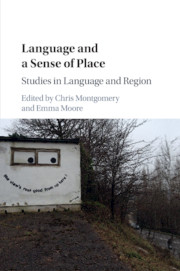Book contents
- Language and a Sense of Place
- Language and a Sense of Place
- Copyright page
- Contents
- Figures
- Tables
- Contributors
- Preface and Acknowledgements
- Introduction
- Part I Changing Places
- Part II Describing Places
- 5 Corpora for Regional and Social Analysis
- 6 Using Archives to Conduct Collaborative Research on Language and Region
- 7 Maps and Mapping in (Perceptual) Dialect Geography
- 8 Which Way to Look?
- Part III Identifying Places
- Part IV Enregistering Places
- Index
- References
6 - Using Archives to Conduct Collaborative Research on Language and Region
from Part II - Describing Places
Published online by Cambridge University Press: 13 July 2017
- Language and a Sense of Place
- Language and a Sense of Place
- Copyright page
- Contents
- Figures
- Tables
- Contributors
- Preface and Acknowledgements
- Introduction
- Part I Changing Places
- Part II Describing Places
- 5 Corpora for Regional and Social Analysis
- 6 Using Archives to Conduct Collaborative Research on Language and Region
- 7 Maps and Mapping in (Perceptual) Dialect Geography
- 8 Which Way to Look?
- Part III Identifying Places
- Part IV Enregistering Places
- Index
- References
- Type
- Chapter
- Information
- Language and a Sense of PlaceStudies in Language and Region, pp. 128 - 146Publisher: Cambridge University PressPrint publication year: 2017



